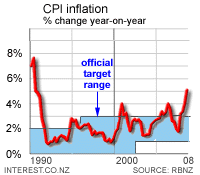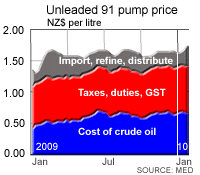 The primary reason that our inflation projections continue to tumble is the rapid drop in commodity prices that are occurring, with the plunge in oil of most importance. When annual CPI inflation peaked at 5.1% in Q3, roughly half of this could be attributed to the previous increase in petrol prices. This being so, if prices had simply stabilised, annual inflation, all other things being equal, would have dropped quickly to 2.5%. However, instead, oil prices, and in turn pump prices, have plummeted. At the time that the RBNZ put its September Monetary Policy Statement together it assumed that the Dubai oil price would be at US$114 per barrel by the end of this year falling to US$95 by March 2011. However, right here and now the price is US$48.54! Clearly this is not fully transferring into retail petrol prices as the drop in the NZD is putting a wedge between the commodity price fall and the pump price movement. Nonetheless, we have seen a massive fall in pump prices too.
The primary reason that our inflation projections continue to tumble is the rapid drop in commodity prices that are occurring, with the plunge in oil of most importance. When annual CPI inflation peaked at 5.1% in Q3, roughly half of this could be attributed to the previous increase in petrol prices. This being so, if prices had simply stabilised, annual inflation, all other things being equal, would have dropped quickly to 2.5%. However, instead, oil prices, and in turn pump prices, have plummeted. At the time that the RBNZ put its September Monetary Policy Statement together it assumed that the Dubai oil price would be at US$114 per barrel by the end of this year falling to US$95 by March 2011. However, right here and now the price is US$48.54! Clearly this is not fully transferring into retail petrol prices as the drop in the NZD is putting a wedge between the commodity price fall and the pump price movement. Nonetheless, we have seen a massive fall in pump prices too.  91 octane petrol peaked at 218.9c/l early in July. It's now 154.9. That's a 29% drop. With petrol weighted at almost 5.5% of the CPI, this drop alone takes 1.6% off your total CPI reading for the period. It knocks around 0.6% off the Q4 CPI alone. Largely because of this, we are forecasting that over Q4 the CPI will rise just 0.1%. We are looking at 0.1 decrease for Q1, 2009. Of course it's not just petrol prices that are falling but so too other commodities. In particular, the surge in dairy prices that has supported New Zealand's rural economy is now unwinding. So much so that it looks odds-on that the retail price of dairy produce will soon start to fall. It may seem strange to be talking of price declines at a time when the NZD is so weak but we would contest that in times of poor demand, as is now the case, it is business that will bear the burden of increased import costs rather than the consumer. While there are a number of businesses suggesting substantial price increases are ahead for shoppers, we question whether the cost increases can be passed on when consumers are retrenching.
91 octane petrol peaked at 218.9c/l early in July. It's now 154.9. That's a 29% drop. With petrol weighted at almost 5.5% of the CPI, this drop alone takes 1.6% off your total CPI reading for the period. It knocks around 0.6% off the Q4 CPI alone. Largely because of this, we are forecasting that over Q4 the CPI will rise just 0.1%. We are looking at 0.1 decrease for Q1, 2009. Of course it's not just petrol prices that are falling but so too other commodities. In particular, the surge in dairy prices that has supported New Zealand's rural economy is now unwinding. So much so that it looks odds-on that the retail price of dairy produce will soon start to fall. It may seem strange to be talking of price declines at a time when the NZD is so weak but we would contest that in times of poor demand, as is now the case, it is business that will bear the burden of increased import costs rather than the consumer. While there are a number of businesses suggesting substantial price increases are ahead for shoppers, we question whether the cost increases can be passed on when consumers are retrenching.  There is a precedent for this. In each of the last two recessions, 1991 and 1998, a sharp drop in the NZD was accompanied by falling inflation. In stark contrast, when the currency fell in 2006 and early 2008, when demand was strong, the inflationary impact was much more marked. We should also note that we are not discounting the currency's drop altogether. We have made upward adjustments to our short term CPI forecasts for the currency's impact on food, car and appliance prices. Moreover, the slow but steady rise in inflation that we predict from mid 2009 onwards is partly a reflection of the currency impact offsetting the disinflationary pulse coming from weaker domestic demand. The leg up in the forecast track toward the end of the period reflects heightened price pressure from the first round impacts of the implementation of the Emissions Trading System. It is highly likely that the incoming government will change the ETS relative to what is currently set down. However, it is less likely that the changes to be made will substantially shift the pricing impact on fuel and electricity generation as already postulated.
There is a precedent for this. In each of the last two recessions, 1991 and 1998, a sharp drop in the NZD was accompanied by falling inflation. In stark contrast, when the currency fell in 2006 and early 2008, when demand was strong, the inflationary impact was much more marked. We should also note that we are not discounting the currency's drop altogether. We have made upward adjustments to our short term CPI forecasts for the currency's impact on food, car and appliance prices. Moreover, the slow but steady rise in inflation that we predict from mid 2009 onwards is partly a reflection of the currency impact offsetting the disinflationary pulse coming from weaker domestic demand. The leg up in the forecast track toward the end of the period reflects heightened price pressure from the first round impacts of the implementation of the Emissions Trading System. It is highly likely that the incoming government will change the ETS relative to what is currently set down. However, it is less likely that the changes to be made will substantially shift the pricing impact on fuel and electricity generation as already postulated.  Eventually, we still believe there will be some serious upside risks to inflation. This largely stems from the impact of the massive fiscal and monetary easing that we are now witnessing both home and abroad. In addition, we also believe the New Zealand economy will quickly come up against capacity constraints when we start to grow near trend again. A condition exacerbated by the lack of investment that is taking place in the current environment. Three to five years hence inflation could well redevelop as a very serious issue both home and abroad but this is a problem for the future. For now, inflationary pressures are heavily weighted to the downside. For this reason, and almost this reason alone, the Reserve Bank will feel comfortable continuing to slash rates. * This Economy Watch Report was written by BNZ Markets' Stephen Toplis. All of the research from the BNZ Markets team of economists is available here.
Eventually, we still believe there will be some serious upside risks to inflation. This largely stems from the impact of the massive fiscal and monetary easing that we are now witnessing both home and abroad. In addition, we also believe the New Zealand economy will quickly come up against capacity constraints when we start to grow near trend again. A condition exacerbated by the lack of investment that is taking place in the current environment. Three to five years hence inflation could well redevelop as a very serious issue both home and abroad but this is a problem for the future. For now, inflationary pressures are heavily weighted to the downside. For this reason, and almost this reason alone, the Reserve Bank will feel comfortable continuing to slash rates. * This Economy Watch Report was written by BNZ Markets' Stephen Toplis. All of the research from the BNZ Markets team of economists is available here.
We welcome your comments below. If you are not already registered, please register to comment
Remember we welcome robust, respectful and insightful debate. We don't welcome abusive or defamatory comments and will de-register those repeatedly making such comments. Our current comment policy is here.